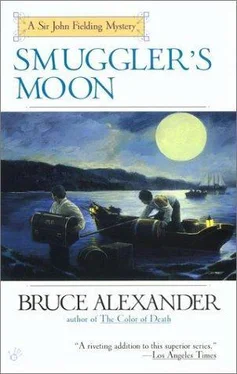Bruce Alexander - Smuggler's Moon
Здесь есть возможность читать онлайн «Bruce Alexander - Smuggler's Moon» весь текст электронной книги совершенно бесплатно (целиком полную версию без сокращений). В некоторых случаях можно слушать аудио, скачать через торрент в формате fb2 и присутствует краткое содержание. Жанр: Исторический детектив, на английском языке. Описание произведения, (предисловие) а так же отзывы посетителей доступны на портале библиотеки ЛибКат.
- Название:Smuggler's Moon
- Автор:
- Жанр:
- Год:неизвестен
- ISBN:нет данных
- Рейтинг книги:4 / 5. Голосов: 1
-
Избранное:Добавить в избранное
- Отзывы:
-
Ваша оценка:
- 80
- 1
- 2
- 3
- 4
- 5
Smuggler's Moon: краткое содержание, описание и аннотация
Предлагаем к чтению аннотацию, описание, краткое содержание или предисловие (зависит от того, что написал сам автор книги «Smuggler's Moon»). Если вы не нашли необходимую информацию о книге — напишите в комментариях, мы постараемся отыскать её.
Smuggler's Moon — читать онлайн бесплатно полную книгу (весь текст) целиком
Ниже представлен текст книги, разбитый по страницам. Система сохранения места последней прочитанной страницы, позволяет с удобством читать онлайн бесплатно книгу «Smuggler's Moon», без необходимости каждый раз заново искать на чём Вы остановились. Поставьте закладку, и сможете в любой момент перейти на страницу, на которой закончили чтение.
Интервал:
Закладка:
“I was fair crushed, so I was, and so I took myself over to an inn in High Street right there in the middle of town to have an ale so as to console myself. Whilst I was there, I fell to talking with a young fellow a bit older than I was. I told him what brought me into Deal and how disappointed I was to be caught short.
“ ‘Well,’ says he, ‘I know how you can earn enough in a night to buy any locket and chain in Deal.’
“ ‘How’s that?’ says I. ‘Is it legal? Is it respectable?’
“ ‘Well, it may not be legal,’ says he, ‘but in this town it’s work that’s damn near respectable. There’s a lugger coming in tonight just filled with Christmas dainties for the lords and ladies of London.’
“I’d no idea what he meant. Finally, with him dropping hints and me trying hard to understand, it come to me that it all had to do with smuggling, that a ship was coming in from France loaded with items of the sort that would be very popular with those in London who had money enough to pay for them. Men would be needed to unload the cargo from the longboats and pack them onto horses and into wagons. It was the offer of a job.
“My newfound employer, whose name was Dick Dickens, told me to be there at the inn at closing time and we’d be right on the hour and the minute to meet the lugger. Well, I was there right enough and went down with Dickens and a whole gang of men to the beach. It was all work once we got there. Once the boats started to ply back and forth from the ship to the shore, it was just a matter of getting them unloaded and the goods transferred to the wagons. We worked fast, for Dick Dickens or one or two others who were in charge were always about telling us to pick up the pace, that it would soon be morning. As it proved out, we was well paid, as promised, but that didn’t mean we didn’t work for it. Strangest thing was, it didn’t seem like we was breaking the law at all-just working hard.
“By dawn the last wagon was gone, and the ship out there off the beach had weighed anchor and was sailing away on the tide. That was when we was paid off. I could scarce believe it when Dick Dickens counted out ten shillings into my hand. He told me I’d earned it, and that I was a good worker, and he wanted to know would I be able to work next time a lugger came across. I told him I would, and we worked out a way he could let me know when I’d be needed. So from then on I was working down on the beach one or two nights a week.
“So for certain sure this wasn’t the sort of winter I’d expected. The way it had been I was happy just having a place to sleep and something to eat each day, but now of a sudden, I was making more money than ever I had in my life. Well, of course I went a bit daft. Instead of the silver locket and chain, I gave the Griggs girl one of gold for Christmas. Naturally, her ma and pa must have wondered where I got the money to pay for it, but they said nothing. And I bought myself a new suit of clothes, though where I supposed I would wear those new duds, I have no idea.
“And through all this, the work on the beach continued. The luggers made the run from France whenever the weather permitted. As it improved, the ships would be coming over often-or so I supposed. I saw, looking ahead to the coming of spring, that I would soon have to make a decision. Was I to continue in the owling trade, or was I to return to my life as a farmhand? How could I, after all, leave the Griggses after they had kept me all winter long? Well, I was saved from that choice by what seemed to me at the time a dreadful circumstance, but was surely a blessing in disguise. I was caught in a raid on the beach carried out by the excisemen together with the Deal constables. Just why I, or Dick Dickens, or any of them, thought this sort of thing on the beach could go on without getting the notice of the excisemen and the magistrate I’ll never know. Or maybe Dickens and those shadowy men behind him thought their bribes had purchased a free hand to operate indefinitely. Or maybe, as Dickens told me on a jail visit, it was all just a misunderstanding. Anyway, this raid looked specially bad, for an exciseman was shot and killed by one of the wagon drivers, an evil old ne’er-do-well named Rufus Tucker. When I heard the sound of that shot, I took off running-and went right into the arms of a constable. Others were better than I was at getting away. In fact, most were, but because a man had been killed, there could be no question of getting off with a fine and jail time. The five of us who went before the magistrate-Rufus Tucker was one-could all have been sent on to Old Bailey, judged guilty, and hanged on the next hanging day. But as it happened, only one was executed, and that was Tucker. The remaining four, not one of us over twenty-five, were given the opportunity to enlist in the Army, and given the chance, we took the King’s shilling. The year was 1758, you see, and replacements were needed for those lost in the American colonies in the war against the French. Well, you see the result: Here I am, a veteran of campaigns in the Ohio Valley and Canada, alive and healthy, though missing an arm. Yet that-as you, Sir John, and you, Jeremy, well know-was lost later in the Grub Street campaign.”
Sir John, who had been squirming a bit during the last sentence or two of Mr. Perkins’s tale, banged upon the ceiling of the coach with his stick, signaling thus to the driver for a stop.
“A good story, well told,” said Sir John to the constable. ”But I fear I must interrupt now and make for the bushes. Pray God this will be the last such stop on this journey.”
The coach came at last to a complete halt. He jumped down to the road below, and I followed with the latest issue of the Gentleman’s Magazine in hand.
“Do you see a likely place, Jeremy?”
“Over this way, sir,” said I, taking him by the arm. (Only in emergencies did he permit this.) I led him off the road to a copse of trees with sufficient undergrowth to provide a blind.
“Paper?”
I put the magazine in his hand.
“You may leave me now, Jeremy. I shall call you when I need you.”
And so leave him I did. There was no arguing with him at such times as these. Insofar as he was able, he maintained his privacy in spite of his blindness.
Returning to the coach, I found Clarissa and Mr. Perkins had taken this opportunity to loosen the knots in their limbs. As I approached, I saw that their attention was wholly taken by something down the road and just out of my sight. The driver and coachman seemed also to be staring off into the near distance. Once I reached them, I saw that the object of their interest was a kind of large cage suspended over the road from the strongest limb of a stout old oak tree. Inside that cage was a skeleton which, as if in some grotesque All-Hallow’s-Eve masquerade, was dressed in a tattered, dusty, and faded suit of clothes. I had heard of such before, though never before had I seen one.
“They call it a gibbet,” said Mr. Perkins, thus informing Clarissa. ” ‘Twas thought a terrible disgrace amongst condemned men to know their bodies would be put on display in such a way.”
“As indeed it should have been,” said the coachman. ”Dead or no, who would want the corbies peckin’ out his eyes or pullin’ off his nose?”
“Gibbets used to be common as flies on a carcass,” said the driver. ”Seemed there was one decorating every cross-road from one end of England to another. Don’t see them so much anymore.”
Clarissa, quite unruffled by the gruesome sight, stared thoughtfully at the gibbet and its contents. ”Who do you suppose it was?” She asked it most indifferently, as if she were merely wondering aloud.
Yet Mr. Perkins took her idle query most seriously. ”Why, I don’t know,” said he, pondering, rubbing his chin. But then did his eyes come alight of a sudden. ”Or perhaps I do,” said he to her. Then did he call up to the driver of the coach: ”How far are we from Deal?”
Читать дальшеИнтервал:
Закладка:
Похожие книги на «Smuggler's Moon»
Представляем Вашему вниманию похожие книги на «Smuggler's Moon» списком для выбора. Мы отобрали схожую по названию и смыслу литературу в надежде предоставить читателям больше вариантов отыскать новые, интересные, ещё непрочитанные произведения.
Обсуждение, отзывы о книге «Smuggler's Moon» и просто собственные мнения читателей. Оставьте ваши комментарии, напишите, что Вы думаете о произведении, его смысле или главных героях. Укажите что конкретно понравилось, а что нет, и почему Вы так считаете.












